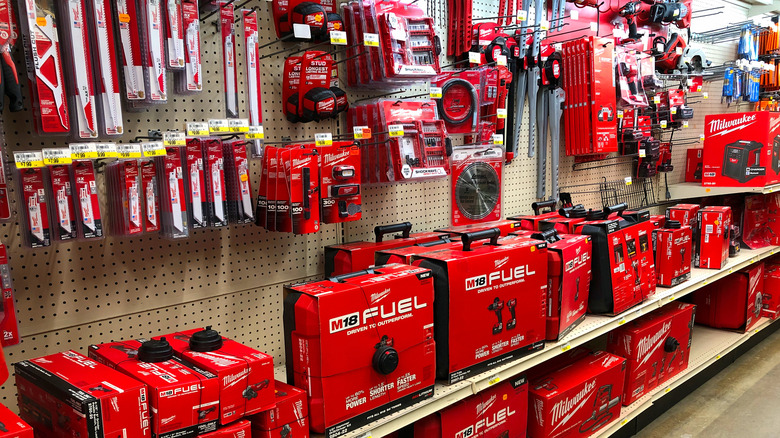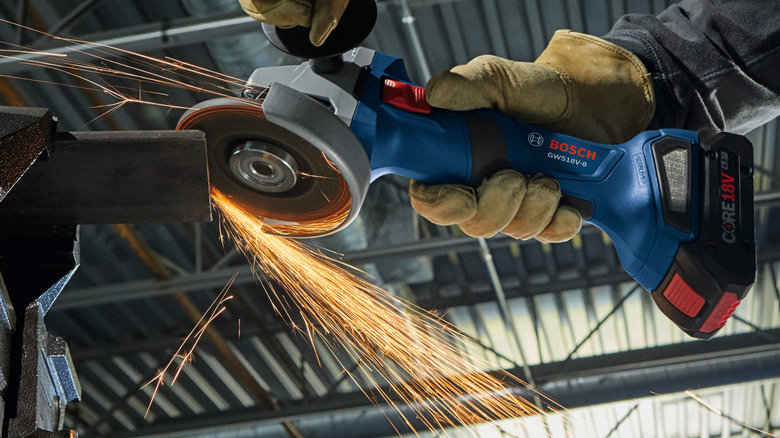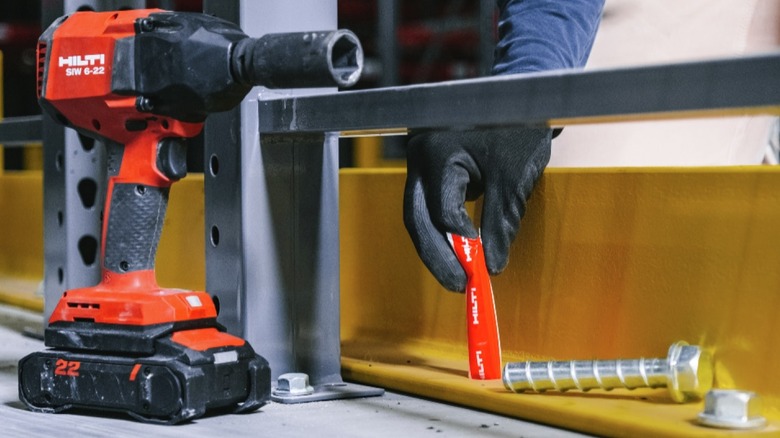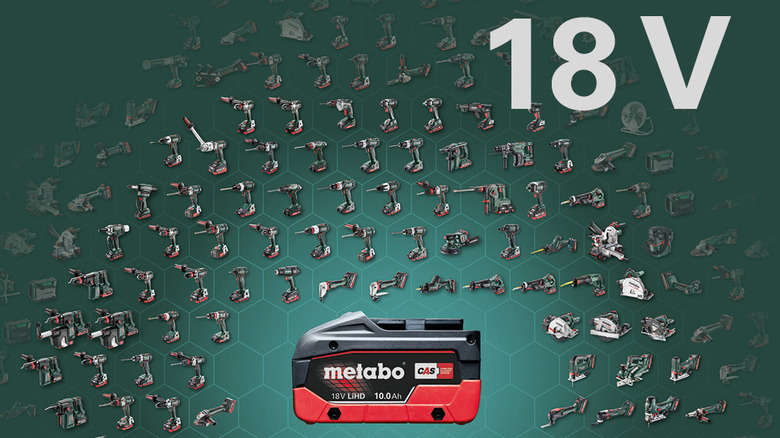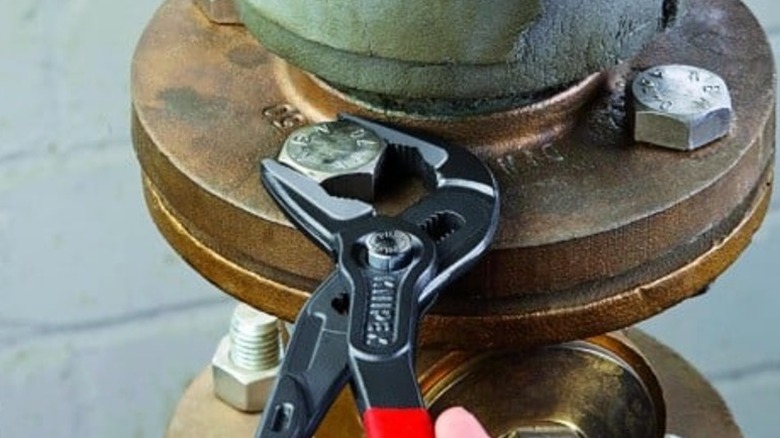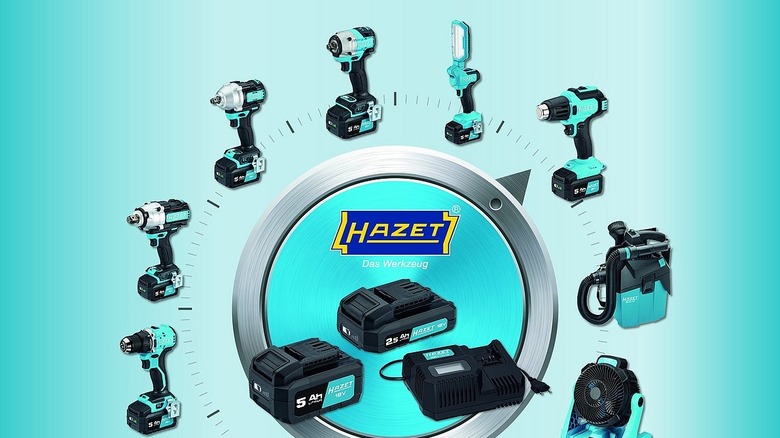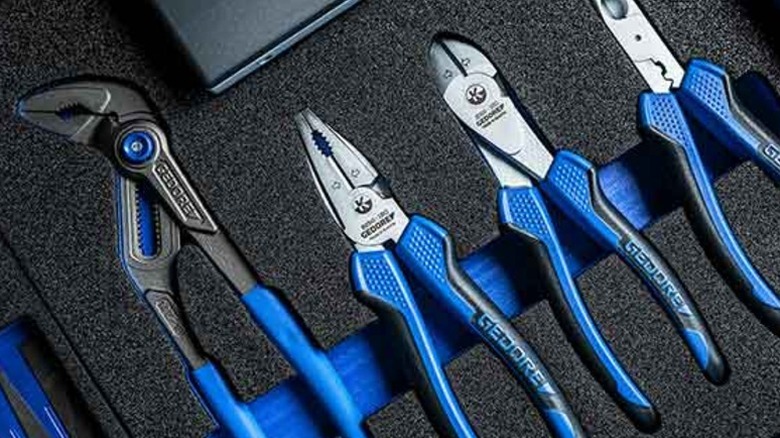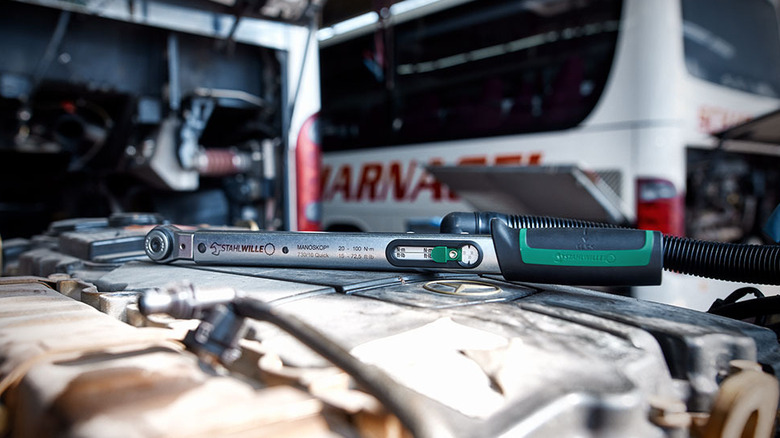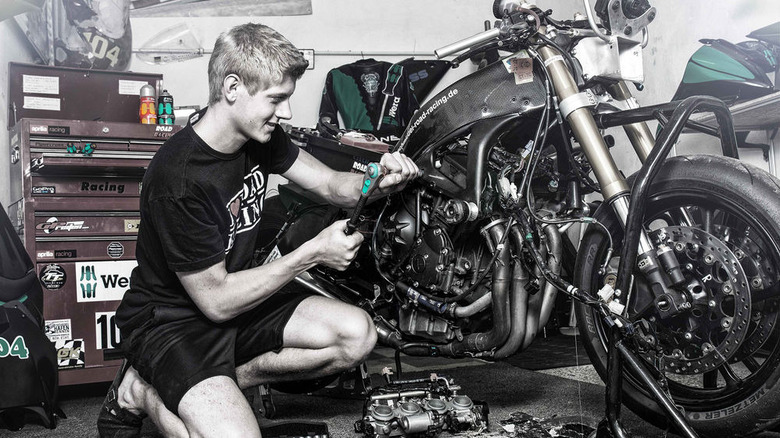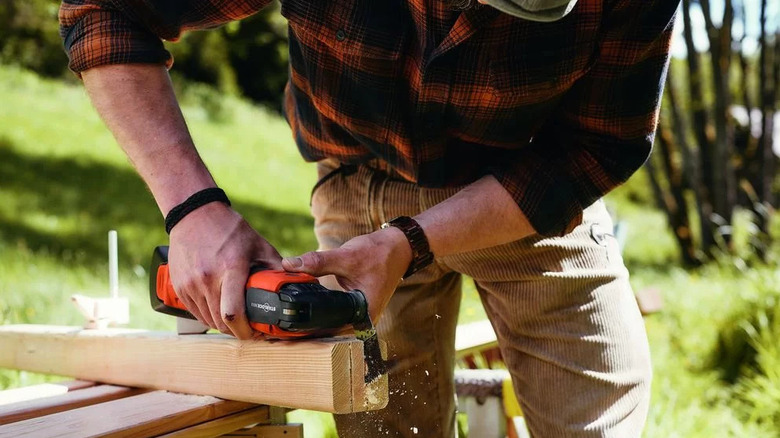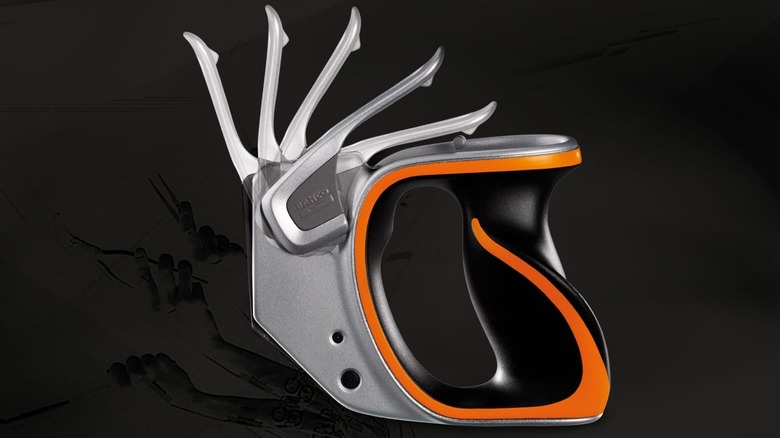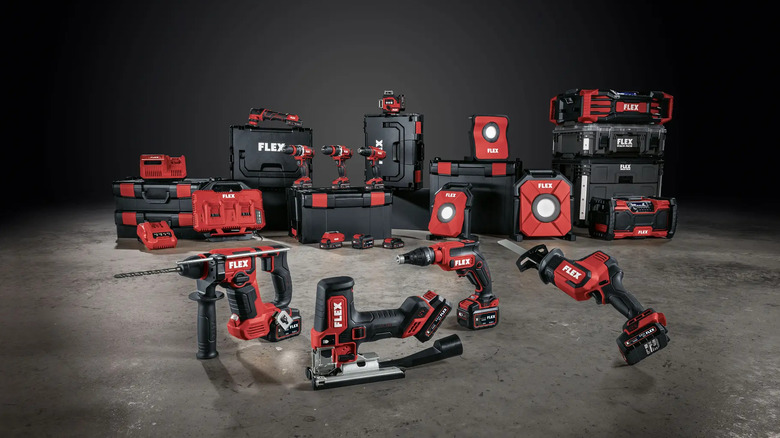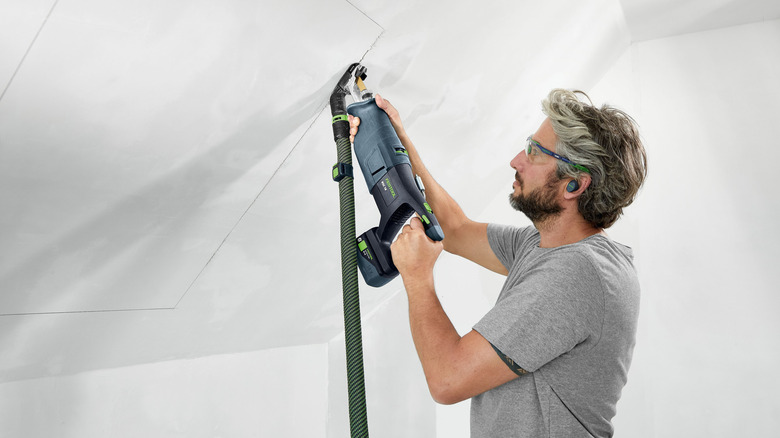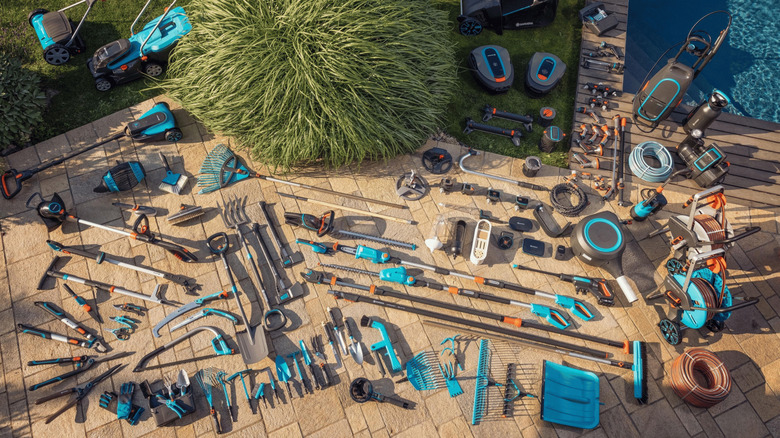13 Of The Best European Tools Brands That Rival Milwaukee
When you think about top-tier tools, your mind probably flashes to a sea of red, and for good reason. Milwaukee has built a heck of an empire. But what if you could get the same level of beast-mode performance, just with a European accent? Across the Atlantic, a league of tool brands is cranking out some seriously impressive gear. These are tools forged from a legacy of careful design and serious power, often flying just under the radar in North America.
To even be considered a true rival, a brand has to bring more than just a fancy name. The gear must be tough enough to take a beating on the jobsite day after day. It needs to be trusted by seasoned pros who bet their paychecks on its performance, and the brand has to double down on what it does best and raise the bar for everyone else. So, if you're ready to expand your tool-rizons, here are 13 European brands with the guts, the gear, and the grit to stand out from the crowd.
Bosch
Bosch power tools set the standard before many brands even showed up to the party, and then raised the bar just for fun. This German powerhouse has been slinging tools since 1886, which means it's had over a century to get ridiculously good at what it does, and it definitely has. Walk onto a jobsite anywhere in Europe, and you'll see that bold blue-and-black gear in action. These tools don't just look the part, either.
Bosch tools just won't quit. Their rotary hammers? Basically indestructible, concrete-chewing beasts. Angle grinders? Welders abuse them daily, and they keep spitting sparks like it's nothing. It's the kind of reliability that makes site managers sleep easy at night. But the ProCore 18V lineup is where things get interesting, as it's the direct answer to the M18 family. The runtime's legit, and the torque hits so hard it might just erase Milwaukee from your wishlist. And that FlexiClick 12V system? Pure genius. One drill body, four heads, and suddenly you've got a whole toolkit in your back pocket.
The real deal-sealer? Bosch covers all the bases: compact drills, massive demo hammers, and everything in between, all on the same battery system. When one brand can handle your electrician's detail work and your demo guy's destruction spree, you've found yourself a keeper.
Hilti
Hilti is the brand everyone knows is serious business. You don't stumble across it on your weekend hardware run, and you definitely don't buy it just to hang a few shelves. This is the gear contractors whisper about like legends. It's all tougher than steel beams, pricier than your rent, and built like it's prepping for battle.
While most tool brands try to do a bit of everything, Hilti goes all in on heavy-duty. Concrete? Steel? Full-scale demolition? That's where these power tools come alive. Ask any crew that's drilled thousands of anchors into a high-rise core, and if they're not already in the club, they'll probably say the same thing: "Wish we had a Hilti."
Their 22V Nuron battery platform is wild — same battery, different tools, all delivering ridiculous power. From compact drivers to mech-suit-worthy demo hammers, the entire system runs like a jobsite dream. The price tag might sting a whole lot, but you're paying for tools that just don't give up. Plus, the white-glove service, direct sales setup, and pro-focused support make it clear: Hilti doesn't cater to everyone. It's for the crews doing the gritty stuff most people avoid.
Metabo
If Hilti owns concrete, then Metabo absolutely rules the metal kingdom. The company's name literally comes from the German word for metal drill (Metallbohrdreher), so yeah, this obsession with metal is baked right into their DNA. For metalworkers, fabricators, and welders, this brand is basically the holy grail.
In fact, their angle grinders are straight-up legendary in metal shops around the world. These things are absolute beasts, built to laugh in the face of flying sparks and metal dust that would have other grinders turning tail and heading home. While Milwaukee makes solid grinders, metal pros often reach for Metabo when they need raw, relentless power on demand. Plus, their safety features are next-level, offering some of the fastest-braking wheels on the market (because nobody wants a runaway grinder).
But here's where Metabo flips the script: the Cordless Alliance System (CAS). Instead of locking you into the Milwaukee M18 tools system, Metabo opens the door to dozens. That same 18V battery? It works across a whole crew of premium European tool brands, from industrial vacs to woodworking gear. Milwaukee may have built a solid ecosystem, but Metabo powers an entire tool multiverse.
Knipex
Milwaukee's hand tools show up loud, with chunky grips, bright red everything, and a whole lot of swagger. Knipex? It skips the theatrics and lets the performance do the talking. This German family company has been perfecting pliers since 1882, and it has turned it into an art form. Every tool is forged from steel that's harder than most people's Monday mornings, then precision machined to tolerances so tight they'd make a Swiss watch blush.
The Cobra pliers are the crown jewel. They lock on like they've got unfinished business and won't let go. The slick self-locking mechanism feels so smooth it's almost unfair. And the Pliers Wrench? It's like someone fused an adjustable wrench with a brain and told it to stop stripping bolts forever. The jaws stay parallel, the grip is rock-solid, and your fasteners come out looking as clean as they went in.
So, it's no surprise that pros treat these tools like sacred gear. Electricians, plumbers, mechanics — once they've used Knipex, they're in for life. Going back feels like trying to eat soup with a fork. Sure, they're not the cheapest tools on the shelf. But the moment you reach for them mid-project and feel that flawless alignment click into place, you just know it was money well spent.
Hazet
Some tools just feel right. Hazet has had that magic for over 155 years, and once you've used any one of its tools, even Milwaukee's best starts to feel like a backup plan. Their sockets slide onto bolts like they were made for each other, and the 600N combination wrenches are built from chrome vanadium steel tough enough to outlast your career. The 90-tooth 863 series ratchets are pure mechanical poetry.
But Hazet doesn't stop at hand tools. Its digital borescope is basically shop-grade X-ray vision. You'll see things in your engine you didn't even know existed (and probably wish you hadn't) — and it's not a one-off. It also offers leak testers, circuit testers, and other diagnostic tools built with the same clean, no-nonsense approach. It's all made for people who'd rather fix it right the first time.
But the real twist? Hazet is now making moves on Milwaukee's 18V kingdom. Impact drivers, grinders, reciprocating saws ... all of it built with the same obsessive fit and finish. Milwaukee's M18 feels like a gym bro flexing. But Hazet's tools? They've been training in silence and just walked in to take the belt.
Gedore
Most brands have a long list of things you shouldn't do with their tools. Don't use a screwdriver as a pry bar, don't put a cheater pipe on a ratchet, and so on. Then there's Gedore. This German toolmaker designed an adjustable wrench so brutally overbuilt that it openly advertises you can use it as a hammer. That one fact tells you everything you need to know about its entire philosophy: Build it strong enough to do its job, then double the strength just in case.
That "hammer-wrench" energy shows up in everything Gedore makes. Its tools are thick where they need to be, refined where it counts, and never feel like they're skating by on good looks. Its torque wrenches are trusted in industries where failure isn't an option, and its sockets lock in like they've signed a contract.
Milwaukee might offer more bells and whistles, but Gedore is the one you'd want in your hand when it truly matters. That's why you'll find Gedore gear in race garages, assembly plants, and serious mechanic shops — the kinds of places where tools don't just need to work, they need to hold their own against torque, time, and total chaos.
Stahlwille
Milwaukee builds tools tough enough to survive a fall from a construction scaffold. Stahlwille builds tools so the airplane you're on never falls in the first place. That's the difference, and it's everything. Of course, it all makes sense when you realize the name translates to "steel will" — a pretty fitting motto for tools used on fighter jets, turbines, and spacecraft.
What sets its hand tools apart? It starts with brains, not just brawn. On its spanner sets (what Americans call box-end wrenches), Stahlwille uses a double-T profile to give each wrench massive strength without the extra weight. Add in the offset shaft design, where the jaws meet the shank, and you've got extra reinforcement exactly where stress loves to strike. No flex, no twist, and definitely no "uh-oh" under load.
Its torque wrenches are in a league of their own. Every single one leaves the factory with a calibration certificate so precise it's absurd (or would be if the stakes weren't so dang high). When the wrench says 47 foot-pounds, it means exactly 47, not 46.8, not 47.2, but spot-on perfect every single time. It's like having a mechanical perfectionist living inside your toolbox, obsessing over every click so you don't have to wonder if you got it right.
Wera
If the other German tool brands are like classical composers — masters of precision and tradition — then Wera is the punk rock band ready to crash the party. It calls itself the "Tool Rebels," and it lives up to the name by looking at everyday tools and asking, "How can we make this way cooler?" Then, it wraps it all in its signature bright green and black as a loud declaration that it's here to do things differently.
Wera's intention is to find and fix all the little things that turn basic tools into your worst enemy. Take its screwdrivers. The Kraftform handle is so ridiculously comfortable it feels like it was custom-molded for your palm. Plus, many of its tools have a Lasertip feature with microscopic grooves to bite into a screw head and refuse to let go — and that's just the start.
This rebellious spirit runs through its whole lineup. The Joker open-ended wrenches have a little metal plate to cleverly hold the nut for you so you don't drop it into an engine bay for the 10th time. The Joker self-setting spanners? Just clamp and go, with no adjusting needed. The Zyklop ratchet has a head that pivots all over the place like a Transformer. It's a screwdriver. It's a T-handle. It's super ... Wera, and that's all you really need to know.
Fein
When it comes to tool cred, Fein doesn't have to prove anything. This German brand invented the power drill, literally. It has been building pro-grade tools since 1867, and it's still got that "first to show up, last to leave" energy.
Fein doesn't chase trends. It chases perfection. Its Multimaster multitools are the stuff of legend, perfect for working with metal, wood, and even plastic. While allowing for true precision, they cut fast, run quietly, and feel like they're gliding through material on autopilot. And the Starlock system? Total game-changer — no more wrestling with hot blades or guessing if your accessory will fit.
The biggest power play? Fein joined the AMPShare battery alliance, meaning its cordless tools run on the same high-performance Bosch batteries. Like Metabo, it's not trying to lock you into its own system (looking at you, Milwaukee). Instead, it's focused on building the best possible tool and letting you power it with an established, top-tier battery. It's a confident, pro-user move from a company with nothing to prove, just results to deliver.
Bahco
Milwaukee gets the hype, sure, but Bahco has the history. This Swedish toolmaker has been shaping the industry since the late 1800s, and the track record's pretty unbelievable. It invented the original adjustable wrench, the first ergonomic handles, the legendary Sandflex saw blades, and so on. The result? Over 400 patents and a tool legacy backed by awards and the kind of workshop loyalty money can't buy.
Bahco tools have a no-nonsense feel. The big idea here was to create tools that feel less like machines and more like an extension of your own hand. It calls it ERGO, but really, it just means Bahco obsesses over every curve and grip to ensure you can work all day without the tool fighting back. It's an intentional design that puts the human first, backed up with the highest quality Swedish steel, so it's tough enough to be handed down through generations.
But here's where Bahco gets absolutely out of pocket: It makes 24,000 different products. Twenty-four thousand! That's like having a tool for every possible thing that could ever need fixing, plus backup tools for the backup tools. If you need it, Bahco has probably made it and then spent even more time perfecting it again and again. Milwaukee might dominate the power scene, but Bahco has quietly outfitted pro-level toolboxes in every trade you can name.
Flex
Milwaukee may dominate the jobsite flex, but Flex power tools led the charge from day one. Back in 1922, it created the flexible shaft that gave it its name. Then, in 1954, it unleashed the world's first high-speed angle grinder, and it changed everything. "Flexen" became the go-to word for angle grinding in Germany, and by 2006, it was officially in the dictionary. Talk about owning a category.
Today's Flex isn't living off past glory. It's coming for Milwaukee's lunch money with its torque-happy 24V cordless lineup. The brushless impact drivers hit like a sledgehammer in sport mode, and the hammer drills rip through wood and concrete like they're late for lunch. And the runtime? Let's just say the stacked lithium battery technology means you'll be charging your phone before you charge your tools.
But this is where Flex proves it thinks like actual tradespeople: Fast charging because time is money, vibration damping designed to keep your hands from going numb, and dust collection that works, rather than just spreading dirt around. It's where the finest German engineering meets "Let's fix everything that's annoying about power tools."
Festool
If you've ever heard someone call a tool brand the "The Apple of ..." anything, they were probably talking about Festool. Selling tools? Maybe on paper. In practice, it's engineering the cleanest, most dialed-in jobsite experience money can buy. It all begins with its obsession over something most people just accept as part of the job: dust.
You see, Milwaukee tools power through whatever mess you're making, and that's cool. But Festool builds tools that refuse to make a mess in the first place. Every saw, sander, and router connects to its ultra-powerful dust extractors, creating work environments so clean you might forget you're doing construction.
Make no mistake, though, clean doesn't mean wimpy. The TS 75 track saw cuts through hardwood like it's slicing butter, delivering edges so perfect you could skip the sanding step entirely. But if you do want to sand, the Rotex 150 makes it feel like cheating. It zips through rough material, then switches to fine finishing mode without missing a beat. And the Domino joiner? It creates mortise and tenon joints with the precision of traditional hand tools but at power tool speed, making complex joinery accessible to mere mortals.
Husqvarna
Most people know Husqvarna as one of the top chainsaw brands that loggers whisper about like it's a Viking legend. But this Swedish powerhouse has been quietly dominating the outdoor power scene for longer than most countries have existed. No joke, it's been at it since the late 1600s, which makes it older than the United States and cooler than your neighbor's vintage axe collection.
Its chainsaws? Total icons. Arborists and lumber pros trust them to fire up every time, chew through monster trees like it's nothing, and keep running when other saws would've tapped out. The X-Torq engines bring the muscle, anti-vibration tech saves your hands, and the build quality? It's definitely the kind of tool you hand down like a family heirloom (covered in sawdust and glory).
But don't box it in. Husqvarna's lineup goes way beyond tree duty. Its robotic mowers are like having a lawn ninja with a PhD in symmetry. Its battery-powered trimmers and blowers ditch the cord and the compromises. As for its zero-turn mowers, Husqvarna's out there mowing circles around the competition, while Milwaukee's still stuck in the self-propelled slow lane.
What it takes to compete with Milwaukee
No shortcuts were taken here. These 13 brands earned their spot by meeting some pretty strict criteria. First things first: durability. This was about tools that could handle the daily grind without crying uncle. Only brands known for tough, jobsite-tested gear made the cut. If it couldn't survive being dropped, getting dusty, or getting drenched, it didn't make this list.
Next, all of these tools are trusted by the trades. These aren't just pretty tools sitting on a shelf somewhere. These names show up in real toolboxes, used by pros who rely on their gear every single day. When your paycheck depends on your tools working, you don't mess around with questionable brands.
Last but not least, it's about building with intention. Some brands go deep on one trade, others serve the whole jobsite, but the common thread is focus. These companies know their users, their use cases, and exactly what their tools are meant to do.
